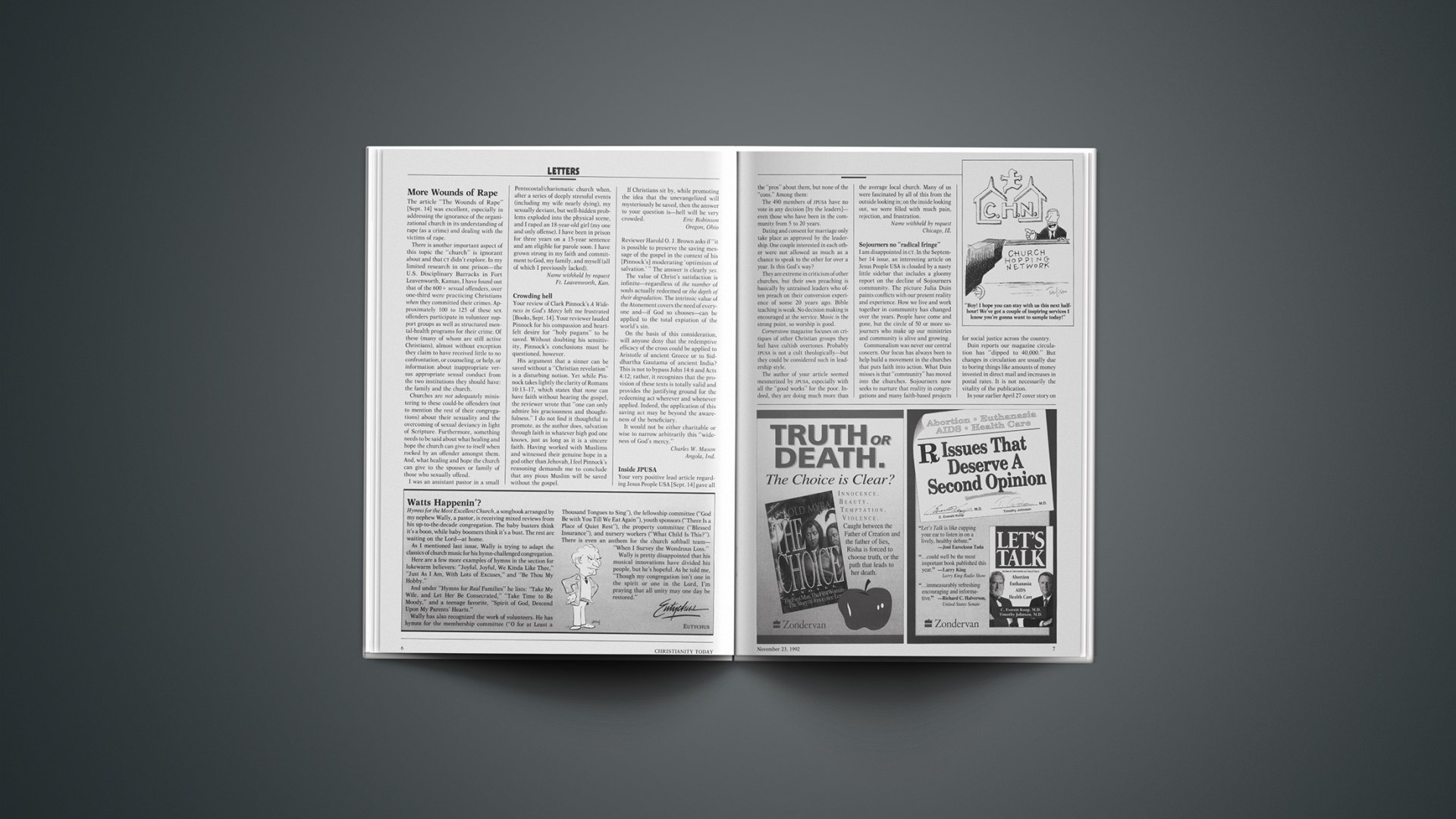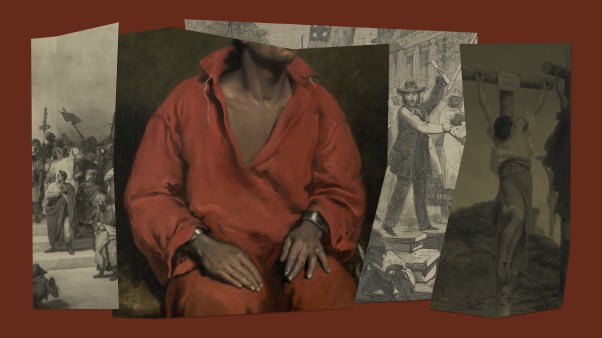More Wounds of Rape
The article “The Wounds of Rape” [Sept. 14] was excellent, especially in addressing the ignorance of the organizational church in its understanding of rape (as a crime) and dealing with the victims of rape.
There is another important aspect of this topic the “church” is ignorant about and that CT didn’t explore. In my limited research in one prison—the U.S. Disciplinary Barracks in Fort Leavenworth, Kansas, I have found out that of the 600+ sexual offenders, over one-third were practicing Christians when they committed their crimes. Approximately 100 to 125 of these sex offenders participate in volunteer support groups as well as structured mental-health programs for their crime. Of these (many of whom are still active Christians), almost without exception they claim to have received little to no confrontation, or counseling, or help, or information about inappropriate versus appropriate sexual conduct from the two institutions they should have: the family and the church.
Churches are not adequately ministering to these could-be offenders (not to mention the rest of their congregations) about their sexuality and the overcoming of sexual deviancy in light of Scripture. Furthermore, something needs to be said about what healing and hope the church can give to itself when rocked by an offender amongst them. And, what healing and hope the church can give to the spouses or family of those who sexually offend.
I was an assistant pastor in a small Pentecostal/charismatic church when, after a series of deeply stressful events (including my wife nearly dying), my sexually deviant, but well-hidden problems exploded into the physical scene, and I raped an 18-year-old girl (my one and only offense). I have been in prison for three years on a 15-year sentence and am eligible for parole soon. I have grown strong in my faith and commitment to God, my family, and myself (all of which I previously lacked).
Name withheld by request
Ft. Leavenworth, Kan.
Crowding Hell
Your review of Clark Pinnock’s A Wideness in God’s Mercy left me frustrated [Books, Sept. 14]. Your reviewer lauded Pinnock for his compassion and heartfelt desire for “holy pagans” to be saved. Without doubting his sensitivity, Pinnock’s conclusions must be questioned, however.
His argument that a sinner can be saved without a “Christian revelation” is a disturbing notion. Yet while Pinnock takes lightly the clarity of Romans 10:13–17, which states that none can have faith without hearing the gospel, the reviewer wrote that “one can only admire his graciousness and thoughtfulness.” I do not find it thoughtful to promote, as the author does, salvation through faith in whatever high god one knows, just as long as it is a sincere faith. Having worked with Muslims and witnessed their genuine hope in a god other than Jehovah, I feel Pinnock’s reasoning demands me to conclude that any pious Muslim will be saved without the gospel.
If Christians sit by, while promoting the idea that the unevangelized will mysteriously be saved, then the answer to your question is—hell will be very crowded.
Eric Robinson
Oregon, Ohio
Reviewer Harold O. J. Brown asks if “it is possible to preserve the saving message of the gospel in the context of his [Pinnock’s] moderating ‘optimism of salvation.’ ” The answer is clearly yes.
The value of Christ’s satisfaction is infinite—regardless of the number of souls actually redeemed or the depth of their degradation. The intrinsic value of the Atonement covers the need of everyone and—if God so chooses—can be applied to the total expiation of the world’s sin.
On the basis of this consideration, will anyone deny that the redemptive efficacy of the cross could be applied to Aristotle of ancient Greece or to Siddhartha Gautama of ancient India? This is not to bypass John 14:6 and Acts 4:12; rather, it recognizes that the provision of these texts is totally valid and provides the justifying ground for the redeeming act wherever and whenever applied. Indeed, the application of this saving act may be beyond the awareness of the beneficiary.
It would not be either charitable or wise to narrow arbitrarily this “wideness of God’s mercy.”
Charles W. Mason
Angola, Ind.
Inside Jpusa
Your very positive lead article regarding Jesus People USA [Sept. 14] gave all the “pros” about them, but none of the “cons.” Among them:
The 490 members of JPUSA have no vote in any decision [by the leaders]—even those who have been in the community from 5 to 20 years.
Dating and consent for marriage only take place as approved by the leadership. One couple interested in each other were not allowed as much as a chance to speak to the other for over a year. Is this God’s way?
They are extreme in criticism of other churches, but their own preaching is basically by untrained leaders who often preach on their conversion experience of some 20 years ago. Bible teaching is weak. No decision making is encouraged at the service. Music is the strong point, so worship is good.
Cornerstone magazine focuses on critiques of other Christian groups they feel have cultish overtones. Probably JPUSA is not a cult theologically—but they could be considered such in leadership style.
The author of your article seemed mesmerized by JPUSA, especially with all the “good works” for the poor. Indeed, they are doing much more than the average local church. Many of us were fascinated by all of this from the outside looking in; on the inside looking out, we were filled with much pain, rejection, and frustration.
Name withheld by request
Chicago, Ill.
Sojourners No “Radical Fringe”
I am disappointed in CT. In the September 14 issue, an interesting article on Jesus People USA is clouded by a nasty little sidebar that includes a gloomy report on the decline of Sojourners community. The picture Julia Duin paints conflicts with our present reality and experience. How we live and work together in community has changed over the years. People have come and gone, but the circle of 50 or more sojourners who make up our ministries and community is alive and growing.
Communalism was never our central concern. Our focus has always been to help build a movement in the churches that puts faith into action. What Duin misses is that “community” has moved into the churches. Sojourners now seeks to nurture that reality in congregations and many faith-based projects for social justice across the country.
Duin reports our magazine circulation has “dipped to 40,000.” But changes in circulation are usually due to boring things like amounts of money invested in direct mail and increases in postal rates. It is not necessarily the vitality of the publication.
In your earlier April 27 cover story on Ron Sider’s contribution to an evangelical social ethic, the author dismisses Sojourners as the “radical fringe of evangelicalism.” What is that supposed to mean? I don’t think the evangelical professors, pastors, and students who read Sojourners feel they are “fringe.”
You also published a companion piece by Mike Cromartie, an ardent political partisan and fierce critic of Sojourners. Cromartie’s very conservative political agenda has long put him at odds with Sojourners’ understanding of the relationship between biblical faith and social justice. Cromartie claims Sojourners’ “popular support has diminished significantly” and speaks of the “marginalization” of Sojourners’ influence, except among “left-wing Catholics and liberal Protestants.” Most ecumenical observers would say the reverse is true; never has Sojourners had more relationship and partnership in as many sectors of the church’s life.
I feel a little like Mark Twain who suggested the reports of his demise were quite exaggerated.
Jim Wallis, Editor and Pastor
Sojourners
Washington, D.C.
Gore: Enlightening, Disturbing
Your interview with Albert Gore was both enlightening and disturbing [Sept. 14]. It is good to know that someone who identifies himself as a Christian cares so passionately for God’s nonhuman creation. However, it is sad that at the same time Gore implicitly calls for federal legislation to prevent the destruction of the environment, he supports legislation that would mandate abortion on demand across the U.S. through the sixth month of pregnancy. Would that he cared at least as much about saving the lives of the million-and-a-half developing human beings whose lives are extinguished in abortuaries every year in the United States.
Peter Schreffler, Ph.D.
Assistant Professor of English
Utica College of Syracuse University
Utica, N.Y.
I want to commend you on balanced coverage of election year issues by including an interview of Albert Gore as well as Dan Quayle. Now I can evaluate both in a good way.
Henry Broadbent
Berkeley, Calif.
Has CT joined most of the rest of the journalistic world in trying to throw the presidential election? Giving Albert Gore your platform for his crusade at this time certainly looks suspicious.
Nate Schwenk
Evensville, Tenn.
At the very least, I hope you will run an interview on Dan Quayle.
Sharon Zink
Crawford, Neb.
We did. See CT, June 22, 1992.
—Eds.
A Tenth Temptation
Being embroiled in the Washington political scene I have witnessed liberals and conservatives alike who eagerly yield to one or more of Vernon Grounds’s nine election-year temptations [Sept. 14]. May I suggest a tenth temptation? “To ascribe dark motives or negative attributes to others simply because they may disagree with us politically.”
Forest Montgomery
Counsel, Office of Public Affairs
National Association of Evangelicals
Washington, D.C.
Watts Happenin’?
Hymns for the Most Excellent Church, a songbook arranged by my nephew Wally, a pastor, is receiving mixed reviews from his up-to-the-decade congregation. The baby busters think it’s a boon, while baby boomers think it’s a bust. The rest are waiting on the Lord—at home.
As I mentioned last issue, Wally is trying to adapt the classics of church music for his hymn-challenged congregation.
Here are a few more examples of hymns in the section for lukewarm believers: “Joyful, Joyful, We Kinda Like Thee,” “Just As I Am, With Lots of Excuses,” and “Be Thou My Hobby.”
And under “Hymns for Real Families” he lists: “Take My Wife, and Let Her Be Consecrated,” “Take Time to Be Moody,” and a teenage favorite, “Spirit of God, Descend Upon My Parents’ Hearts.”
Wally has also recognized the work of volunteers. He has hymns for the membership committee (“O for at Least a Thousand Tongues to Sing”), the fellowship committee (“God Be with You Till We Eat Again”), youth sponsors (“There Is a Place of Quiet Rest”), the property committee (“Blessed Insurance”), and nursery workers (“What Child Is This?”). There is even an anthem for the church softball team—“When I Survey the Wondrous Loss.”
Wally is pretty disappointed that his musical innovations have divided his people, but he’s hopeful. As he told me, “Though my congregation isn’t one in the spirit or one in the Lord, I’m praying that all unity may one day be restored.”
EUTYCHUS










